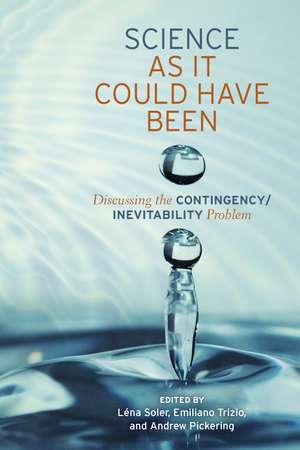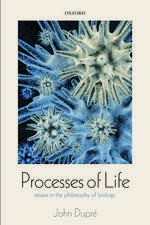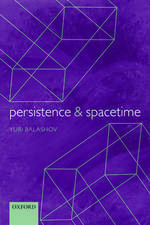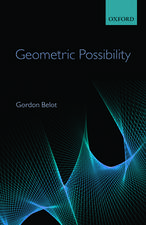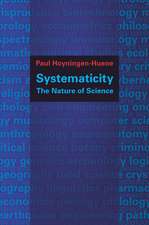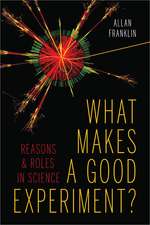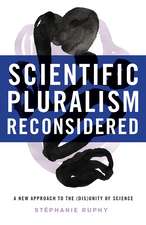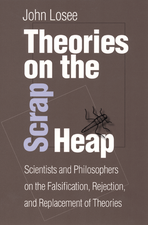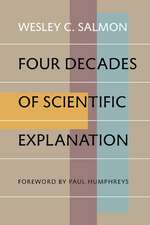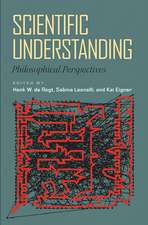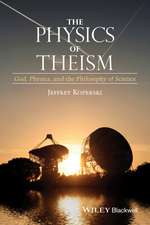Science as It Could Have Been: Discussing the Contingency/Inevitability Problem
Editat de Lena Soler, Emiliano Trizio, Andrew Pickeringen Limba Engleză Hardback – 30 noi 2015
Could all or part of our taken-as-established scientific conclusions, theories, experimental data, ontological commitments, and so forth have been significantly different? Science as It Could Have Been focuses on a crucial issue that contemporary science studies have often neglected: the issue of contingency within science. It considers a number of case studies, past and present, from a wide range of scientific disciplines—physics, biology, geology, mathematics, and psychology—to explore whether components of human science are inevitable, or if we could have developed an alternative successful science based on essentially different notions, conceptions, and results. Bringing together a group of distinguished contributors in philosophy, sociology, and history of science, this edited volume offers a comprehensive analysis of the contingency/inevitability problem and a lively and up-to-date portrait of current debates in science studies.
Preț: 470.21 lei
Nou
Puncte Express: 705
Preț estimativ în valută:
89.97€ • 93.95$ • 74.30£
89.97€ • 93.95$ • 74.30£
Carte disponibilă
Livrare economică 25 martie-08 aprilie
Preluare comenzi: 021 569.72.76
Specificații
ISBN-13: 9780822944454
ISBN-10: 0822944456
Pagini: 472
Ilustrații: 4 b&w illustrations
Dimensiuni: 152 x 229 x 33 mm
Greutate: 0.79 kg
Ediția:1
Editura: University of Pittsburgh Press
Colecția University of Pittsburgh Press
ISBN-10: 0822944456
Pagini: 472
Ilustrații: 4 b&w illustrations
Dimensiuni: 152 x 229 x 33 mm
Greutate: 0.79 kg
Ediția:1
Editura: University of Pittsburgh Press
Colecția University of Pittsburgh Press
Recenzii
“The most comprehensive publication on the problem of contingency in science to date, and as such, it serves well to gauge philosophical opinions on the matter.”
—Studies in History and Philosophy of Biological and Biomedical Sciences
—Studies in History and Philosophy of Biological and Biomedical Sciences
“This well-edited, integrated volume of essays . . . illustrates welcome professionalism and maturity in a study of science that would have been rare a few decades ago. Highly recommended”
—Choice
—Choice
“This is an absorbingly interesting symposium on the question of, in Ian Hacking's phrase, how inevitable the results of successful science are. The issues in play are as important as they are difficult, benefiting from the kind of unhurried, expert but often unorthodox examination they receive over the course of this volume. Science as It Could Have Been will establish itself straightaway as defining the state of the art and will surely become a necessary reference point for all future work.”
—Gregory Radick, University of Leeds
—Gregory Radick, University of Leeds
“Contingency is an important topic that deserves far more attention from philosophers of science and other science studies experts than it has so far received. Science as It Could Have Been is the most comprehensive treatment of the central issues concerning contingency and inevitability to date. Anyone curious about this ongoing debate in science and mathematics should begin here.”
—Thomas Nickles, University of Nevada, Reno
—Thomas Nickles, University of Nevada, Reno
Notă biografică
Léna Soler is associate professor of philosophy of science at the University of Lorraine. She is the author of Introduction à l’épistémologie and editor of Science after the Practice Turn in the Philosophy, History, and Social Studies of Science.
Emiliano Trizio is an instructor of philosophy at Seattle University.
Andrew Pickering is professor of sociology and philosophy at the University of Exeter. He is the author of Constructing Quarks, The Mangle of Practice, and The Cybernetic Brain: Sketches of Another Future.
Emiliano Trizio is an instructor of philosophy at Seattle University.
Andrew Pickering is professor of sociology and philosophy at the University of Exeter. He is the author of Constructing Quarks, The Mangle of Practice, and The Cybernetic Brain: Sketches of Another Future.
